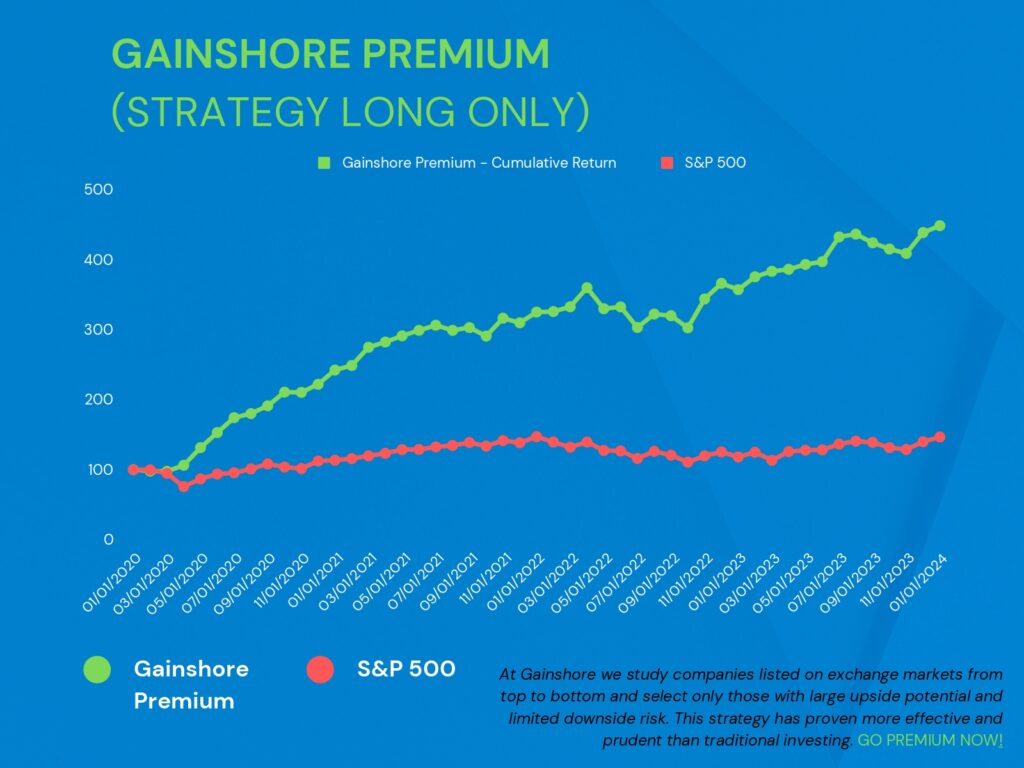In this article, we will list the most popular Artificial Intelligence ETFs designed to track the performance of companies engaged in Artificial intelligence (AI), robotics, and automation, show the main characteristics and key statistics of each AI ETF, and provide a brief overview of the most important Artificial Intelligence stocks making up the portfolios of the best 6 shortlisted Artificial Intelligence ETFs.
Table of Contents
The impact of ChatGPT on AI stocks and AI ETFs
There is currently a lot of hype on Artificial Intelligence (AI), following the widespread news about ChatGPT and its potential power to revolutionize the world and potentially disrupt entire industries and generate massive productivity enhancements alongside changes replacing classic jobs performed by humans and potentially cause a rise in unemployment rates.
Despite AI being born a long time ago and its applications having been widely used in many forms for some time, the current positive market sentiment towards AI stocks has fuelled capital inflows into AI stocks and ETFs while boosting stock prices at a historically high level, notwithstanding the weak global conditions of financial markets.
To learn more about Artificial Intelligence, read the article https://www.gainshore.com/artificial-intelligence-stocks/
The extent to which Artificial Intelligence can benefit a stock is not as simple as we think. Moreover, some AI stocks could be negatively rather than positively impacted by the increased adoption of Artificial Intelligence when performing recurring or complicated tasks.
Best Artificial Intelligence Stocks – download report
At Gainshore, we analyse thousands of companies, thoroughly screen the best ones and select only the best of the BEST STOCKS and ETFs, which we constantly monitor.
We tell you WHERE WE INVEST OUR CAPITAL, and if we are wrong, you get the money back. That’s how confident we feel with our winning approach.
Discover now the Best Investments For 2023, or subscribe to our newsletter to learn more.
The Artificial Intelligence Stock Market
The AI stock market comprises at least 300 AI listed companies and many more privately held AI enterprises, which, by using or designing AI-based products and services, are positioned to ride the Artificial Intelligence wave and potentially duplicate in value in the future.
The Consumer Technology Association (CTA) determines whether a company can be classified as an Artificial Intelligence stock if it falls within these three categories:
Enablers – Companies that develop the building block components for robotics or AI, such as advanced machinery, autonomous systems/self-driving vehicles, semiconductors, and databases used for machine learning.
Engagers – Companies that design, create, integrate, or deliver robotics and AI in products, software, or systems.
Enhancers – Companies that provide their own value-added services within the AI and robotics ecosystem but are not core to their product or service offering.
Best Artificial Intelligence ETFs
1. First Trust Nasdaq AI and Robotics ETF (ROBT)
Focused on the companies that develop the building block components used for machine learning – each AI stock category is weighted with AI engagers receiving 60%, AI enablers receiving 25%, and enhancers receiving 15%.
EQUALLY WEIGHTED – The selected companies are weighted equally within each category. To learn more about index weighting, read www.gainshore.com/exchange-traded-funds/
DIVERSIFIED AMONG SMALL, MID, AND LARGE CAP – Market Capitalization > $250 Mln
5+ YEARS TRACK RECORD – Fund inception date: 02/21/2018
HIGHLY DIVERSIFIED – 107 holdings: 2.6% Top 1 position / 7% Top 3 / 12% Top 5
GEOGRAPHICALLY biased towards the United States – Top 3 Countries: 50% US, 12% Japan, 6% France
EXPENSE RATIO: 0.65%
2. iShares Robotics and Artificial Intelligence Multisector ETF (IRBO)
Seeks exposure to companies at the forefront of robotics and artificial intelligence innovation.
4+ YEARS TRACK RECORD – Fund inception date: 06/26/2018
GEOGRAPHICALLY biased towards the United States and China – Top 3 Countries: 53% US, 14% China, 10% Japan
HIGHLY DIVERSIFIED – 117 holdings: 2% Top 1 / 5.5% Top 3 / 8% Top 5
EXPENSE RATIO: 0.5%
3. ARK Autonomous Tech. & Robotics ETF (ARKQ)
Seeks long-term growth by investing in domestic and foreign equity securities of autonomous technology and robotics companies that are expected to focus on disruptive innovation in automation and manufacturing, transportation, energy, artificial intelligence, and materials.
FOCUSED ON LARGE AND MEGA CAPS
8+ YEARS TRACK RECORD – Fund inception date: 09/30/2014
WIDER SECTORIAL DIVERSIFICATION biased towards Autonomous Vehicles
NARROW GEOGRAPHICAL DIVERSIFICATION – 92% US
HIGHLY CONCENTRATED – 34 holdings: 15% Top 1 (Tesla) / 31% Top 3 / 45% Top 5
EXPENSE RATIO: 0.75%

4. L&G ROBO Global Robotics and Automation UCITS ETF (ROBO)
The first robotics and automation ETF to market, providing investors access to rapidly evolving robotics, automation and artificial intelligence companies producing enabling technologies and applications that have the potential to be a driving force of change and propel global economic growth and productivity.
MULTI-CAP FOCUSED ON MID AND LARGE CAPS
9+ YEARS TRACK RECORD – Fund inception date: 10/21/2013
SECTORIALLY DIVERSIFICATION biased towards Manufacturing, Healthcare and Computing
WIDE GEOGRAPHICAL DIVERSIFICATION – 44% US, 21% Japan, 7% Germany
DIVERSIFIED – 79 holdings: 1.9% Top / 5.5% Top 3 / 7% Top 5
EXPENSE RATIO: 0.8%
5. Robotics & Artificial Intelligence ETF (BOTZ)
The Global X Robotics & Artificial Intelligence ETF (BOTZ) seeks to invest in companies that potentially stand to benefit from increased adoption and utilization of robotics and artificial intelligence (AI), including those involved with industrial robotics and automation, non-industrial robots, and autonomous vehicles.
MULTI-CAP FOCUSED ON MID AND LARGE CAPS
6+ YEARS TRACK RECORD – Fund inception date: 09/12/2016
SECTORIALLY DIVERSIFICATION biased towards Industrial Machinery
WIDE GEOGRAPHICAL DIVERSIFICATION – 44% US, 33% Japan, 11% Switzerland
CONCENTRATED – 50 holdings: 10% Top 1 (Intuitive Surgical) / 28% Top 3 / 43% Top 5
EXPENSE RATIO: 0.7%
6. Generative AI & Technology ETF (CHAT)
The Roundhill Generative AI & Technology ETF (CHAT) is designed to provide exposure to companies involved in the investment theme of artificial intelligence, generative artificial intelligence, and related technologies.
Generative AI is an artificial intelligence technology that uses neural networks to generate new data similar in structure and format to existing data. Unlike other AI techniques that use existing data to make predictions or classifications, generative AI can create entirely new original and unique data. This is accomplished through complex algorithms that learn to recognize patterns and relationships within large datasets, allowing the AI system to generate new content or ideas similar in style or format.
77% LARGE CAPS
RECENTLY LAUNCHED – May 2023
FOCUSED ON GENERATIVE ARTIFICIAL INTELLIGENCE
GEOGRAPHICALLY biased towards the United States and China – Top 3 Countries: 69% US, 24% China, 2.6% Japan
HIGHLY CONCENTRATED – 29 holdings: 8% Top 1 (NVIDIA) / 23% Top 3 / 31% Top 5
EXPENSE RATIO: 0.75%

Questions & Answers
What is the most diversified Artificial Intelligence ETF?
The iShares Robotics and Artificial Intelligence Multisector ETF (IRBO) is the most diversified Artificial Intelligence ETF with no holdings weighing more than 2%.
What Artificial Intelligence ETFs had the highest annualized performance since inception?
The ARK Autonomous Tech. & Robotics ETF (ARKQ) had the highest annualized performance since its inception, at about 12.5% as of Q2 2023.
The second highest-performance ETF is the Robotics & Artificial Intelligence ETF (BOTZ), with an 8.5% annualized return as of Q2 2023.
What is the Artificial Intelligence ETF exhibiting the lowest volatility?
The L&G ROBO Global Robotics and Automation UCITS ETF (ROBO) exhibited the lowest volatility.
What is the Artificial Intelligence ETF with the lowest expense ratio?
The cheapest Artificial Intelligence ETF is the iShares Robotics and Artificial Intelligence Multisector ETF (IRBO), with an annual expense ratio of just 0.45%.
However, funds’ expenses shall not be the first thing to evaluate when comparing funds and ETFs; learn why here: https://www.gainshore.com/investment-research/#fund
What percentage of the portfolio shall be allocated to Artificial Intelligence stocks?
Between 5% and 20% of the portfolio could be allocated to Artificial Intelligence thematic ETFs or stocks.
Investing in ETFs reduces the risk of being overexposed to one or few entities, while to achieve superior returns, one shall carefully select only the best stocks among the entire universe of stocks falling under the Artificial Intelligence theme. Read more here: https://www.gainshore.com/exchange-traded-funds/#downsides-of-et-fs
BEST ETFs and STOCKS TO BUY NOW
Thanks to our meticulous and stringent screening analytical process, Gainshore has achieved an extraordinary 100% winning rate on LONG TERM STOCKS, and the SHORT TERM STOCKS have repeatedly been beating all global equity markets.
Our stock recommendations have grown about 250% since 2020 while exhibiting minimal negative volatility despite COVID-19, the Ukraine War and the current high inflationary environment.
Discover the 10 ETFs to buy now, or become a Premium member to unlock our full selection of best Funds, ETFs and Long Term Stocks.
Disclaimer: Nothing in this write-up is financial advice. Gainshore’s founder, partners, and employees may hold long or short positions in some or all the stocks and ETFs mentioned in this article. This article was written by Gainshore and expresses our own opinion. Gainshore has no business relationship with any company whose stock or ETF is mentioned in this write-up.
Before making any investment, potential investors should do their own proper due diligence on any name directly or indirectly mentioned in this article. Investors should also consider seeking advice from a broker or financial adviser before making investment decisions. Any material in this article should be regarded as general information and not relied on as a formal investment recommendation.







